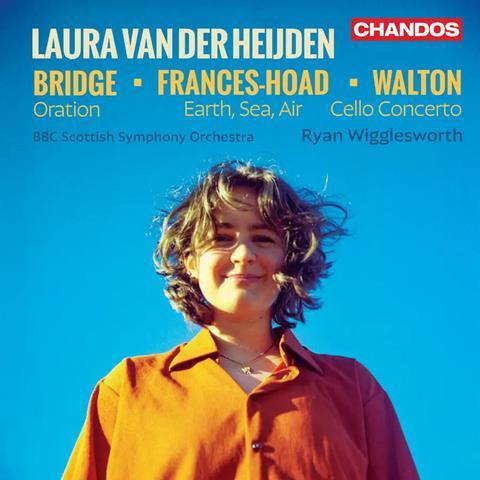Superbly intense readings from a young British cellist forging her own path

THE STRAD RECOMMENDS
The Strad Issue: July 2024
Description: Superbly intense readings from a young British cellist forging her own path
Musicians: Laura van der Heijden (cello) BBC Scottish Symphony Orchestra/Ryan Wigglesworth
Works: Bridge: Oration. Frances-Hoad: Earth, Sea, Air. Walton: Cello Concerto
Catalogue number: CHANDOS CHSA5346
A ruminative and glowering rhapsody in a continuous half-hour span, Oration takes some holding together. The Chandos engineering sensitively places the spotlight firmly on Laura van der Heijden, with Wigglesworth and his orchestra touching in background detail, as a wordless and baleful protest against war. Other soloists have brought more extroversion to the solo part, but the 2012 BBC Young Musician winner captures a quintessentially English quality of sullen and repressed eloquence which will not express itself in long and soaring phrases.
In this sense, the other two concertos present complementary facets of English cello writing. The soloist is a more positive and extrovert actor in Cheryl Frances-Hoad’s concerto in all but name. More memorable than the melodic material itself is the steady accumulation of tension through the ingeniously varied episodes of ‘Earth’, and the soft swell of ‘Sea’ takes over as though van der Heijden had walked down to the shore. The glinting orchestration of this nocturne brings us to a beach not so far from Britten’s Aldeburgh, before ‘Air’ lifts off on currents of entirely 21st-century harmony.
Read: Life Lessons: Laura van der Heijden
Watch: Cellist Laura van der Heijden plays Walton in BBC Young Musician final 2012
With the opening bars of Walton’s concerto, however, the earlier pieces are eclipsed – or perhaps that’s simply the effect of Wigglesworth’s deft hand on the tiller and van der Heijden’s ownership of the solo part. In conversational dialogue with the orchestra, she gives a more muted and vulnerable cast to the first movement’s slow dissolve than Steven Isserlis, and her scherzo is a perilously skittish affair, lacking the last degree of definition but throwing caution to the winds. The finale is again stretched to extremes of dynamic and rhetorical gesture which we associate more with Shostakovich than Walton, and to electrifying effect.
PETER QUANTRILL























































No comments yet